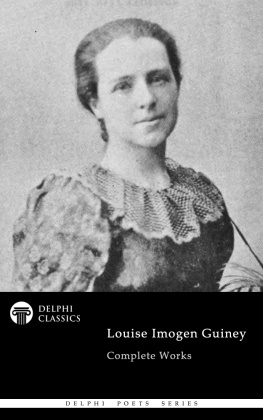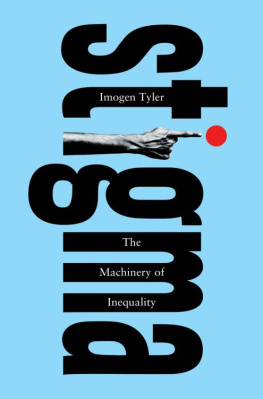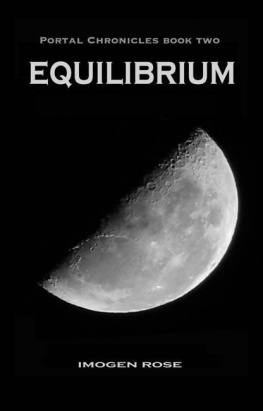@media all { body { margin: 0.5em; padding: 0; width: 98%; } p { margin-top: 0.1em; text-align: justify; margin-bottom: 0.1em; text-indent: 1em; } hr.divider, hr.divider2 { border-width: 0; margin: 0; } .poetry-container { width: 80%; margin-left: 10%; margin-right: 10%; } .poetry { display: block; margin-left: 2em; } img { max-width: 100%; width: auto; height: auto; } .tn { width: 80%; margin: 0 10%; background: #dcdcdc; padding: 1em; } a { color: inherit; text-decoration: inherit; } .dropcap-float { float: left; } .hide-hand { display: none; } }
This ebook is dedicated to
Emmy
friend, colleague, mentor, role model,
who fell off the planet far too soon.
Title page
MONSIEUR HENRI
A FOOT-NOTE TO
FRENCH HISTORY BY
LOUISE IMOGEN GUINEY
NEW YORK HARPER & BROTHERS
PRINTERS & PUBLISHERS MDCCCXCII
Copyright, 1892, by Harper & Brothers .
All rights reserved.
TO
MADAME MARIE-ANGE BONDROIT
R.S.C.J.
When you were first an exile, and at Elmhurst, I was a child. Six studious years we had together, many games, a tiff or two, much silent love. It is because I do not forget any of them, and because it may stand as a little token of an honorable and lifelong debt, that to you, my dear old friend, without asking your leave, I dedicate this book.
I have looked narrowly into this war of La Vende, full as it is of scenes and faces; I have thought of it by day, and dreamed of it by night. It is not cold, commonplace war, waged for ambition and policy, nor for commercial advantage; it is a war deep-rooted in the soil and in the conscience of man; a war all for family and fatherland, in the antique impassioned way; a Homeric war, inspiring dread and admiration, pity and love.... Everything in it calls for the palette and the lyre.A Republican officer, quoted by Abb Deniau, Histoire de la Guerre de la Vende.
And mark you, undemonstrative men would have spoiled the situation. The finest action is the better for a piece of purple. Robert Louis Stevenson , in The English Admirals.
Fleur de lis
PREFACE.
S
O little concerning the French provincial struggle of the eighteenth century has found an echo in our language, that the British Museum and the Bodleian Library have not three original references between them to add to the local archives (most of them, alas! still confused and uncatalogued), of the Bibliothque Nationale. Madame de La Rochejaqueleins beautiful Mmoires still serve as the basis for whatever may be said on the subject; and where I have differed from her by a hair, it has not been without reluctance, and the comparison of many oracles.
I do not plead for pardon in treating an all-but-hallowed theme in a rather high-handed fashion, since every grain here has been painfully sifted and weighed, and the material, if not the proportioning of it, is true as truth. But in so treating it, I bore in mind that excision is the best safeguard against decay, that time throws away as rag and bobtail the political specifications thought to be precious, and that we must at once, and in the nobler sense, romanticize such dry facts as we mean shall live.
It is always the character of the man which vitalizes the event; what did or did not happen is, ultimately, of minor importance beside the spectacle of a strong soul. A background may be blurred for the sake of a single figure. I tried, therefore, to paint a portrait, willing to abide by the hard saying of Northcote: If a portrait have force, it will do for history.
To the Rev. Walter Elliott, editor of The Catholic World, who allows me thus to incorporate and remodel a sketch first contributed to its pages; to Monsieur le Cur and Monsieur le Vicaire of Saint-Aubin-de-Baubign, who, for the sake of the immortal Red Handkerchief unknown to English literature, brightened my frosty travels in the old Bocage; to Madame la Comtesse de Chabot of Boissire; to Mademoiselle de Chabot, Henris young kinswoman and annalist, whose ardent researches have verified many of the data I give, and to Monsieur de Chabot, also, who drew for his sisters soldierly book the admirable chart now kindly lent me for transmarine use, I return, this late, my faithful and ever affectionate thanks.
L. I. G.
London, 1891.
Fleur de lis
MONSIEUR HENRI:
A FOOT-NOTE TO FRENCH HISTORY.
B
EFORE a crowd of excited farmers, a young Frenchman, blond, enthusiastic, delicately-nurtured, made once this singular oration: Friends! if my father were here, you would have confidence. As for me, I am only a boy, but I will prove that I deserve to lead you. When I advance, do you follow me; when I flinch, cut me down; when I fall, avenge me! Then amid the cheers and tears of peasants, he sat in the great court-yard of his fathers abandoned house, and munched with them their coarse brown loaves. It was the first slight sign of his consecration to a cause. He had spoken famous words, hardly to be matched in history; words which have travelled far and wide, and proclaimed his spirit where his name is utterly unknown. Yesterday he was a carpet-knight; now, like gallant Murray in the song,
His gude sword he hath drawn it,
And hath flung the sheath awa.
There was no retrogression. Henri du Vergier de La Rochejaquelein, twenty years old, a little indolent hitherto, an athlete, a critic of horses and hounds, was suddenly shaken out of his velvet privacy into the rude lap of the Revolution.
He was born in the village of Saint Aubin de Baubign, near Chtillon-sur-Svre, in the broad-moated, wood-surrounded feudal castle of La Durbellire, on the thirtieth of August, 1772. He came of fighting stock. Among the ancestors of his name there were Crusaders, two warriors slain under Francis I. at Pavia, and a dear brother-in-arms of Henry of Navarre, who was wounded beside him on the battle-field of Arques. Henris father, the Marquis Henri-Louis-Auguste, died of the opening of an old scar in 1802, after able service in San Domingo, where he was defeated, with his English allies, by the blacks and the forces of Spain; his wife, a proprietress there, described in the parish books at home as the high and powerful lady Constance-Lucie-Bonne de Caumont Dade, was destined to survive her son also, but not long. They were the parents of two other sons and of four daughters, of all of whom it is perfect eulogy to say that they were alike. Henri, the second child and eldest boy, was intended for the military profession: while the supreme political storm was brewing he was completing his studies at Sorze. This famous school in Lower Languedoc was just then, under the benignant rule of Dom Despaulx, in its prime. In the great plain under the shadow of Pepins Tower, the Benedictines could marshal their four hundred boys, in blue uniforms faced with red. Henri was probably something less than an enthusiast in botany and dancing (for all the arts had excellent show at Sorze), but gentle as he was, he had no disrelish for the novitiate of war. He must have apprehended, even at the still college where, long after, the radical Republican, Pre Lacordaire, set his bust to smile down upon the bent heads of the study hall, what strange transatlantic winds were already blowing over France. He looked forward always to a campaign, to spurs and sabres, and some mighty Jericho to assail. Courage he had as a birthright; the splendid animal nonchalance in face of danger, and, later, in a measure almost as ample, the fortitude of soul which endures and is patient. He went directly from school to Landrcy in 1785, joining the garrison as sub-lieutenant, his first commission being in the Royal Polish regiment, of which his father was then colonel. The marquis, a person of worth and fortune, had every reason to be pleased with his pretty cavalryman of thirteen, who had to get along as he could, without public favors, and who was treated with complimentary strictness.











